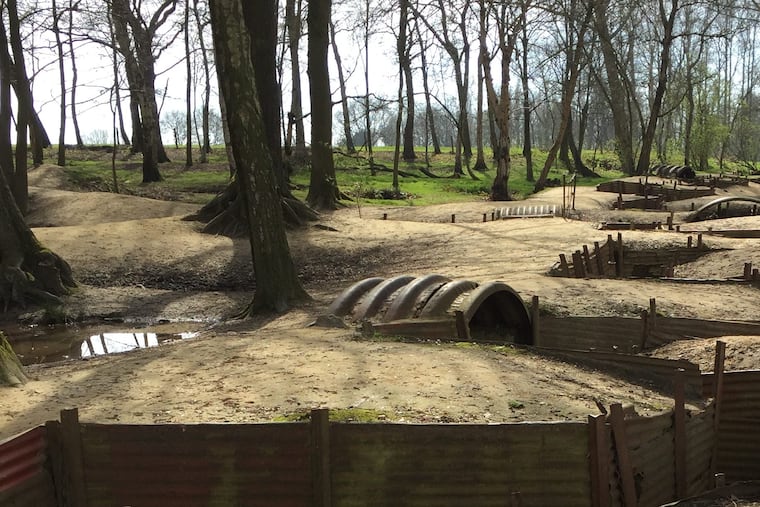‘Nationalist’ Trump attends WWI centennial in France meant to warn ‘never again’ | Trudy Rubin
French President Macron intended the Nov. 11 anniversary to warn against the hard nationalism that led to war, but the rise of demagogues in Europe and America will undermine him.

Donald "I am a nationalist" Trump is in France on Nov. 11 to commemorate the 100th anniversary of the end of World War I – a monstrous slaughter provoked by the blind nationalism of European leaders.
The meeting's host, French President Emmanuel Macron, has been touring WWI battlefields in a desperate effort to warn Europeans of the perils of unchecked nationalism that devastated the continent early in the 20th century and led inexorably to WWII. I can attest to the emotional wallop those battlefields hold; last year I visited some remaining trenches nestled in the rolling hills of Flanders Fields in Belgium, where the 1917 battle of Passchendaele produced 325,000 Allied deaths (and killed 260,000 Germans) for a gain of five miles.
The institutions of the European Union and NATO were meant to prevent the repeat of such uber-nationalist carnage, binding Germany together with its onetime enemies and providing a bulwark against the Soviet Union and now Russia. They did their job.
Yet, despite the presence of 60 world leaders for the ceremony on Nov. 11, Macron is fighting an uphill battle, with Germany's Angela Merkel on her way out, and populist nationalist parties gaining strength across the continent. A mass gathering of hard-right nationalists will march through Warsaw on Nov. 11 as they did last year.
And then there is Macron's garrulous guest Trump, who proudly told followers at a rally in Houston last month: "You know what I am? I'm a nationalist, OK? I'm a nationalist. Nothing wrong. Use that word. Use that word."
As Macron grasps, there is something very wrong with Trump's careless adoration of that n-word. Even though the threats posed by the contemporary variants of nationalism differ greatly from what they were in the early 1900s, they have the power to deeply damage democratic societies and cause wars.
To understand those threats, you must start by examining the historical usage of the term nationalism and how it is being misrepresented by Trump.
In its most simple usage, the term nationalism is often interchanged with patriotism. But they usually mean two very different things.
Webster defines patriotism as "a love for or devotion to one's country."
Nationalism, on the other hand, is more exclusionary. Webster defines it as "a sense of national consciousness exalting one nation above all others," emphasizing the promotion of its interests "as opposed to those or other nations or supranational groups." Us over them.
Although there has been a tug throughout U.S. history between internationalists and isolationists, Trump's ode to "America First" and denunciation of "globalism" has special resonance in the current era.
The term nationalism has become associated with white supremacist or other racist or anti-Semitic groups, or, courtesy of Trump, with anti-immigrant hysteria. "We've seen nationalism distorted into nativism, and forgotten the dynamism that immigration has always brought to America," former President George W. Bush warned last year.
After Trump's recent ode to "nationalism," Christian Picciolini, a former leader of the American white power movement, tweeted: "Trump's `I'm a Nationalist' comment will likely represent the biggest boon for white supremacist recruitment since the film Birth of a Nation glorified the Klan in 1915. …"
This same brand of nativist nationalism has been used by populist political movements in England, France, Germany, Austria, Italy, Poland, Hungary, and elsewhere — not to address needed immigration reform but to whip up political fears.
The leaders of these European nativist nationalist parties have nothing like the heft of Hitler. But they do have a common desire to hollow out the institutions of liberal democracies, muzzle the press, politicize the courts, and undermine constitutions. No wonder they are often praised by Trump, or his onetime chief strategist Steve Bannon.
Project this nativist nationalism onto the global stage and you have a return to a nasty dog-eat-dog competition rather than cooperation among democracies. This plays into the hands of a rising China and a Russian spoiler regime.
But when it comes to Trumpian nationalism, the cost to Americans and the world rises even higher. The president defines nationalism as the antithesis of what he calls "globalism." "A globalist is a person that wants the globe to do well, frankly, not caring about our country so much," Trump says.
According to that dizzy definition, Trump openly disdains the European Union, longtime alliances such as NATO, and any multilateral organization, and believes he can resolve America's foreign-policy challenges by solo negotiations with autocrats such as Vladimir Putin, Xi Jinping, and Kim Jong Un.
But as we have already seen, a solo Trump has made little headway on key issues. He needed U.N. and other allied cooperation to get Kim to the table (and has achieved little so far in bilateral U.S.-North Korea negotiations). Ditto for needing multilateral help to make progress with Iran on sanctions.
Nor is Trump likely to make headway in a one-on-one tariff war with China; his best chance was to align allies in a united front vs. Beijing — as in the Trans Pacific Partnership trade deal he junked.
And, despite Trump's denials, the U.S. can't successfully cope with the massive challenges of global warming and cyber threats without multilateral assistance. If World War III comes, it will be largely waged in cyberspace but could have hideous consequences on land.
As the pragmatic Macron realizes, nativist nationalism is a delusion delivered to discontented publics by demagogues. A different delusion than demagogues used to justify WWI, but a dangerous delusion just the same.